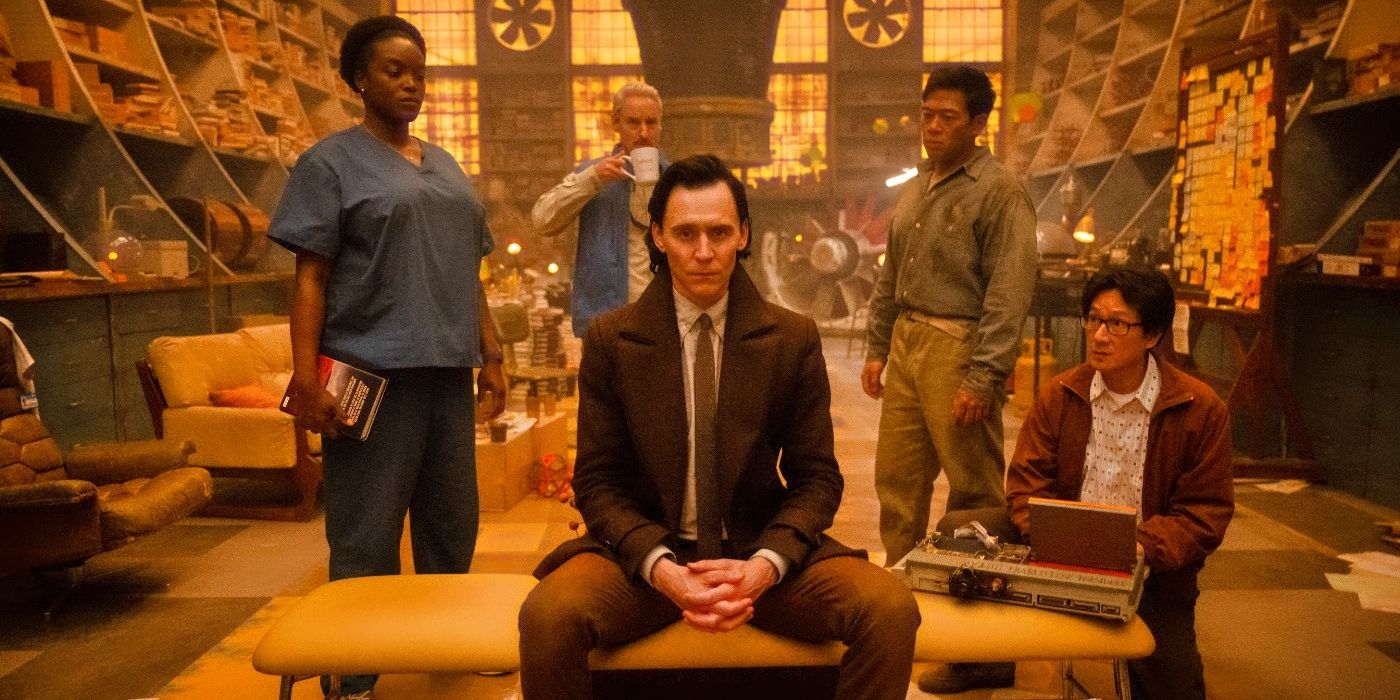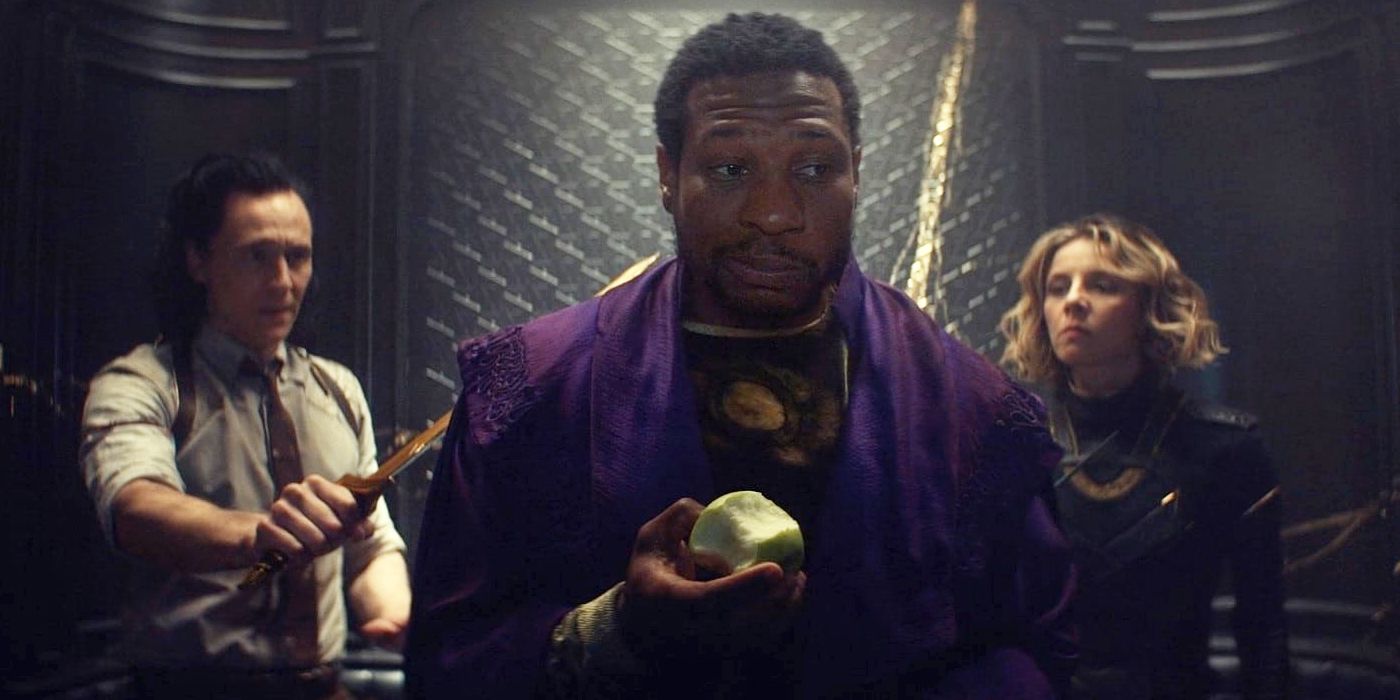Editor’s Note: The following contains spoilers for the Loki Season 2 finale.
The Big Picture
- Loki uses the multiverse in a refreshing way, focusing on the character’s redemptive arc rather than relying on cameos and connections to other Marvel properties.
- The show successfully introduces new characters like Mobius, who adds comedy and a different perspective, and Sylvie, who allows for more emotionally complex storytelling.
- The presence of He Who Remains as a villain forces Loki to make critical decisions and explore his identity, but the show doesn’t rely on teasing future events or connecting heavily with the rest of the MCU.
To say that the Marvel Cinematic Universe no longer has the support that it once did would be an understatement. Avengers: Endgame had managed to tie up the “Infinity Saga” in a satisfying way, but the new films and shows released as part of the “Multiverse Saga” have had continuously diminishing returns. There are many culprits for this; the oversized expectations, side effects of the COVID-19 shutdowns, the SAG-AFTRA strike, overexposure of content on Disney+, and superhero fatigue could all be to blame for the MCU’s current state. Regardless, it’s a disappointing period of time to be an MCU fan, as catching up on the latest films and shows within the universe has begun to feel more like “homework” than anything else. This is exactly why Loki is the best example of what the universe has accomplished in the post-Endgame era. Loki doesn’t rely on the rest of the MCU to function as a story because it works on its own terms.
Loki
Loki, the God of Mischief, steps out of his brother’s shadow to embark on an adventure that takes place after the events of “Avengers: Endgame.”
- Release Date
- June 9, 2021
- Cast
- Tom Hiddleston, Owen Wilson, Gugu Mbatha-Raw, Richard E. Grant
- Seasons
- 2
- Studio
- Disney+
‘Loki’ Uses the Multiverse to Its Advantage
Although the multiversal storyline initially seemed like a fun way to expand the universe, it has been increasingly used as a lazy excuse to generate excitement. The overreliance on cameos from other Marvel properties has made the characters’ individual storylines feel less important. Why is it worth investing in a single character if they could be revived at any moment? Loki was the first MCU project that used the multiverse to say something interesting about the character. As the show’s very first episode reveals, this isn’t the same Loki (Tom Hiddleston) that had made up with his brother in Thor: Ragnorak and sacrificed himself to defeat Thanos (Josh Brolin) in Avengers: Infinity War. This is merely a variant of Loki, who just days prior tried to take over New York City with an army of Chitauri and trying to proclaim himself as a god among men.
Instead of resetting the narrative back to square one, this decision to use a different version of Loki helps make his redemptive arc more compelling. This is clearly a new Loki whose character arc is just beginning; viewers who missed out on some of his appearances in the previous phases got to enjoy his new journey without feeling like they had missed something. Loki gets a good dose of reality in the first episode when the Time Variance Authority forces him to take a look at his entire life’s worth of decisions. Loki realizes that all the petty arguments that he had with Thor (Chris Hemsworth) and attempts to take over Asgard never really matter in the long run. This was a great way for the show to summarize the events of the first few phases by having Loki reflect on his past at the same time as the audience did.
The show’s setting also helps to feel disconnected from the rest of the Marvel universe. The Time Variance Authority office literally takes place outside of space and time; it doesn’t really matter what’s happening on Earth when there are more important things at stake. However, the nature of the TVA allows the series to occasionally flash back to key sequences within Loki’s past that have a significance upon his current journey. This allowed the show to enjoy the benefits of the previous MCU projects without feeling like a burden. Although those that had witnessed the arc by the previous Loki may have been charmed by some of the references, those that hadn’t yet caught up didn’t feel like they were missing out on any key moments.
‘Loki’ Successfully Introduced New Characters
Loki has also done a great job at introducing new characters into the universe. It’s more emotionally compelling for the series to start new character arcs instead of relying on development from previous projects. Mobius (Owen Wilson) is a great addition to the MCU, as the perspective of a TVA authority who views the “multiverse” as simply an element of his profession was an interesting one to incorporate. In fact, Mobius’ annoyance with the confusing nature of the different timelines might feel relatable for those that felt similarly overwhelmed by the narratively dense canon. It was important to give Loki a new friend who has a different perspective than he does; both Loki and Mobius realize that they are simply pawns in a larger Multiversal War.
The relationship between Mobius and Loki works perfectly for both MCU fans and novices. Their adventures feel like a fun buddy cop adventure that just so happens to take place in the MCU. While Mobius adds a healthy amount of comedy to the series, the usage of Loki’s variant Sylvie (Sophia Di Martino) allowed the series to reach more emotionally complex places. Loki’s relationship with another version of himself allows him to analyze his choices, identity, and perspective. While the dynamic between Loki and Sylvie was an interesting way to examine self-love, both characters have their own trajectories. Although Sylvie shows the same curiosity and aptitude for danger that Loki does, her attempts to get revenge on He Who Remains (Jonathan Majors) make her a darker character.
Kang and the MCU Doesn’t Really Matter in ‘Loki’
The connection to He Who Remains is Loki’s biggest connection to the rest of the MCU, but the show does not rely on the presence of an overarching villain to succeed, He Who Remains is an effective villain because he forces Loki to make critical decisions about his responsibilities. The decisions about protecting the sacred timeline are ones that Loki would have had to make anyway, and having a villain like He Who Remains only intensifies the situation. Although Loki’s mission to stop He Who Remains’ variants may have ramifications within the rest of the MCU, it does not tease out future events for the sake of giving Loki himself a satisfying conclusion.
At its best, the MCU is a great sandbox that different creators can play in and bend to their will. At its worst, it’s a dense mythology that requires viewers to keep up with countless projects that they don’t really care about in order to appreciate what’s coming up. Loki belongs to the former category. It’s a great time-bending adventure series that explores the decisions that shape someone’s identity. Any connection to The Avengers is just secondary.
All of Loki is streaming on Disney+ in the U.S.
Watch Now
Source link


